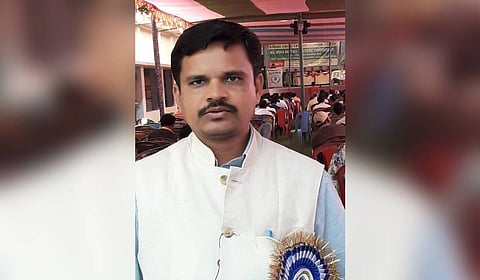Pharmacist’s passion to enrich Santali language
BHUBANESWAR: Development of a community’s language is important to keep its heritage alive, believes Santali writer Maheswar Soren. Which is why, he has been juggling between his passion for writing and profession as a pharmacist for over a decade to enrich Santali language by authoring books, dramas and scripts for films on various aspects of his community. One of his dramas has been chosen for this year’s Central Sahitya Akademi Award.
Maheswar will receive the award for ‘Seched Sawnta Ren Andha Manmi’ (Blind People of an Educated Society) that he had written in 2018. The drama is a take on people who do not wish to shoulder the responsibility of building a society that upholds human values.
The 44-year-old is the youngest Santali writer from Odisha to receive the prestigious literary honour, the others being Damayanti Beshra (2009), Gangadhar Hansda (2012), Arjun Charan Hembram (2013), Gobinda Chandra Majhi (2016) and Kali Charan Hembram (2019).
A pharmacist at Jagannathpur community health centre (CHC) in Mahanga block of Cuttack district, Maheswar finds it difficult to balance writing and his hectic work schedule. “But I write for the cause of Santali language. Its development and propagation across the country is essential to keep the Santali heritage and traditions alive,” said the author who hails from Udala in Mayurbhanj.
He started writing in Odia when he was in Class IX. As years passed by, Maheswar shifted to writing in his mother tongue Santali. He considers himself lucky to have cleared his matriculation examination in Santali.
After completing his ITI in stenography from a government-run ITI institution in Cuttack, he pursued his Plus II in Mayurbhanj and then went on to study D Pharm. While he continued contributing stories, short stories, essays, poems to local Santali magazines, his first serious stint with publishing began only after he started working as a pharmacist in a government-run health centre in 2009.
“When I began earning money, I saved it for attending the annual conferences of All India Santali Writers’ Association that has been promoting the Santali language since its establishment in 1988. Because, I knew I would meet writers there who would help me hone my writing skills,” he said. In 2015, he published his first book of poetry ‘Shikariya’ which contains 40 poems on tribal freedom fighters written over a period of two months. The book was appreciated and nominated for Sahitya Akademi Yuva Puraskar.
The book was followed up with two stories that were adapted into Santali movies ‘Dulha ra Maiya’ and ‘Dharam Darbar’ which were released in northern Odisha districts, West Bengal, Assam and Jharkhand.
Although he writes about the society at large, Maheswar’s literature is primarily directly towards giving an insight into the tribal culture, documenting their rituals and beliefs. He is currently giving finishing touches to two books - ‘Bhandan Binti’ and ‘Sohrai Binti’ - which speak about two important Santal rituals Bhandan and Sohrai. Bhandan is a ritualistic song sung as a part of post-death rituals in Santali households and revolves around birth, death and phases of life in between.
Similarly, ‘Sohrai Binti’ documents the cattle festival of Sohrai observed in Mayurbhanj, Keonjhar and Sundargarh districts and also by Santals from neighbouring states of West Bengal, Jharkhand and Bihar. The two books will be published after a month, he said.
His last book was ‘Karam Binti’, published in 2023, in which he documented Karam Puja (harvest festival) of the tribals. “Along with the oral traditions, we need written literature on Santal beliefs and culture for the next generation to know about them. Every relevant literary work in this direction is like a drop in the ocean,” he said.

